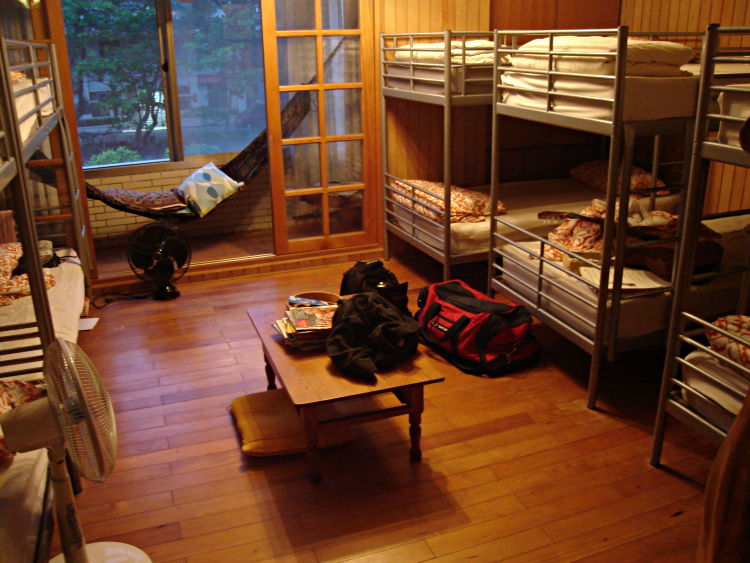Adventure Travel
The Hostel: A love story

Image: Wikipedia
The word “hostel” conjures up many images. Grimy backpackers. European burn-outs. If you’re an American of a certain age you probably associate it most with a low budget horror movie.
But the reality of the hostel is far more than contrived mutilation and Swedes with dreadlocks. The hostel can be cramped, dirty, poorly run, little more than a place to crash for the loose detritus of humanity. But it can also be a place to exchange ideas. A second home. A refuge.
This allure of meeting different people from all over the world, as well as the low price tag, have had travelers crowding the barrack style dormitories of hostels for decades. But there are many who have never experienced the agonizing frustration of a bad hostel or the camaraderie of a great one. So what is a hostel? And how do you ensure that you separate the bad from the good?
First, you need to understand that hostels are extremely diverse. You can find hostels run out of converted apartment buildings, 13th-century castles, and even repurposed 747 jets.
Most hostels will have a few things in common, however. The central idea, of low price accommodations through the use of dormitory style rooms is essentially what the hostel is at its core. The average price will usually be about $15-20 a night, though it can be as low as $5-10 or as high as $40, depending on where you are. In addition, most hostels offer the chance to upgrade to a private room with a standard double bed and bathroom. This option will run into hotel-like prices of $100 or so, which sort of defeats the point.
More importantly, if you take that option you are missing out on the true value of the hostel. It isn’t just a cheap room filled with snoring backpackers, though it certainly is that. It is a community in miniature. The worst hostels are basically flophouses. But the best are run almost like communes.
Hostels are often staffed by volunteers who perform the basic maintenance and other chores necessary to keep the place running in exchange for a place to stay. Often, this core of dedicated volunteers surrounded by an ever-changing shell of strangers from all over the world creates an atmosphere that simply cannot be replicated anywhere else.
The hostel staff creates the tone which is communicated, unspoken, to each guest. Food is left unmarked yet un-pilfered in the refrigerator and common dishes washed immediately after use—you can leave your laptop on the table and no-one will take it.
This is the sort of place the hostel can be. Where the overwhelming vibe of sincerity and good cheer can turn the place into a utopia in miniature. Guests are inspired by the atmosphere set by the staff, and their own better nature compels them to emulate it.
Meanwhile, in every corner of the common areas, people from all over the world are shifting through two or three languages at once, piecing together enough understanding to communicate with people they would otherwise have never met.
While you may not have much privacy, you can never be lonely in a good hostel. Invariably, someone will extend an invitation to you to come out drinking with them, and you will make friends you will remember for the rest of your life, even if you don’t remember much of the time you spent together.
A great hostel can have you canceling your train tickets, or extending your travel plans so you can spend more time there.
These are the sorts of places you should strive to find while traveling. The internet is a good start these days. Sites like hostelworld.com can point you to hundreds of reviews of hostels in every city, as well as allow you to book immediately through their app. Word of mouth is a great resource too. Make sure to ask your new friends for recommendations for the next city you plan to visit.
Look for hostels with common kitchen areas. There is nothing like being invited by a new friend to sample some of their Paella, and often you will get a delicious meal for the price of a smile.
Many hostels also offer collective excursions or classes. For instance, many will offer the chance to take informal classes in the local language for a nominal fee. Not only could you make new friends this way, but you could pick up a life-long skill.
And consider what you can do to help make the hostel better for others as well. There are a few basic rules of etiquette that are important to remember. With 8-10 people in a room, conditions can get a bit cramped. Make sure not to leave your clothes or possessions lying around where they will clutter up the room or get in other people’s way. Don’t take a bed if someone else has claimed it. Claim your own bed by setting your sheets or sleeping bag on it. In the kitchen and bathroom, try to keep things tidy. Any dishes you use should be cleaned and replaced as soon as you finish with them.
Finally, be open to new experiences. Approach the experience of staying in a hostel with relish instead of grimacing acceptance. When you embrace the hostel spirit, it will embrace you back.





0 comments